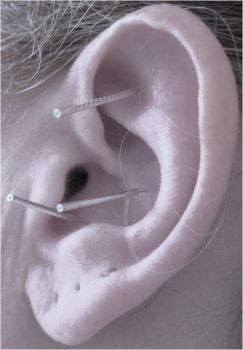New study from University of Sussex proves acupuncture offers relief from radiotherapy side effect
Thursday, October 25, 2012
Acupuncture offers relief from radiotherapy side effect, research shows
 Acupuncture treatment for xerostomia
Acupuncture treatment for xerostomia
Patients suffering from a distressing side-effect of radiotherapy for head and neck cancers can benefit from acupuncture treatment, reveals a new study published yesterday (Wednesday 24 October).
Patients who have received radiotherapy for head and neck cancer often suffer from the unpleasant and distressing side-effect of a dry mouth, caused by damage to their salivary glands from the radiation.
Now, a new study has shown that acupuncture can relieve the symptoms of dry mouth (known as xerostomia). The findings from the largest trial yet to investigate the benefit of acupuncture to xerostomia sufferers are published in the cancer journal Annals of Oncology.
The study involved the work of Dr Valerie Jenkins, from the psychosocial oncology group – SHORE-C (Sussex Health Outcomes Research and Education in Cancer) – which is based on the Sussex campus and is part of the Brighton and Sussex Medical School.
Dr Jenkins managed the study andaconsultant clinical oncologist at the Royal Sussex County Hospital, Dr Richard Simcock, is one of the study’s authors.
Xerostomia affects a patient’s quality of life, interfering with taste, chewing, speaking and sleeping. Short-term solutions such as mouthwashes, gels and toothpastes provide some respite, while treatment with a drug called pilocarpine has its own unwanted side-effects.
Doctors at seven cancer centres (including the Royal Sussex County Hospital in Brighton) recruited 145 patients suffering from radiation-induced xerostomia to take part in a trial to compare acupuncture with education about oral care.
Patients who had received nine weeks of acupuncture were twice as likely to report improvements in their condition as patients receiving oral care, even though the researchers found there were no significant changes in the production of saliva.
Dr Simcock says: “Time had an important effect on key symptoms, with patients receiving acupuncture showing a quick response, which was sustained over several weeks.”
Dr Jenkins adds: “The scepticism that exists about complementary therapies such as acupuncture is often due to inadequately designed and reported studies. This was a well-controlled, randomised trial conducted in major cancer centres throughout UK with good governance and reporting of adverse events.”
The researchers say that further studies are needed to refine the acupuncture technique and discover how long its effect lasts and whether booster sessions might be required. But they believe that the therapy could be easily incorporated into the care of patients with xerostomia.
Dr Simcock says: “This is a neglected group of patients suffering from a most unpleasant side-effect for which all other ameliorative interventions have failed to address adequately. The acupuncture can be delivered simply and cheaply in normal hospital surroundings and yet still produces a significant benefit for patients with a chronic symptom.”
Contact
For all booking and information, get in touch by phone or through the website.
01323 819 157